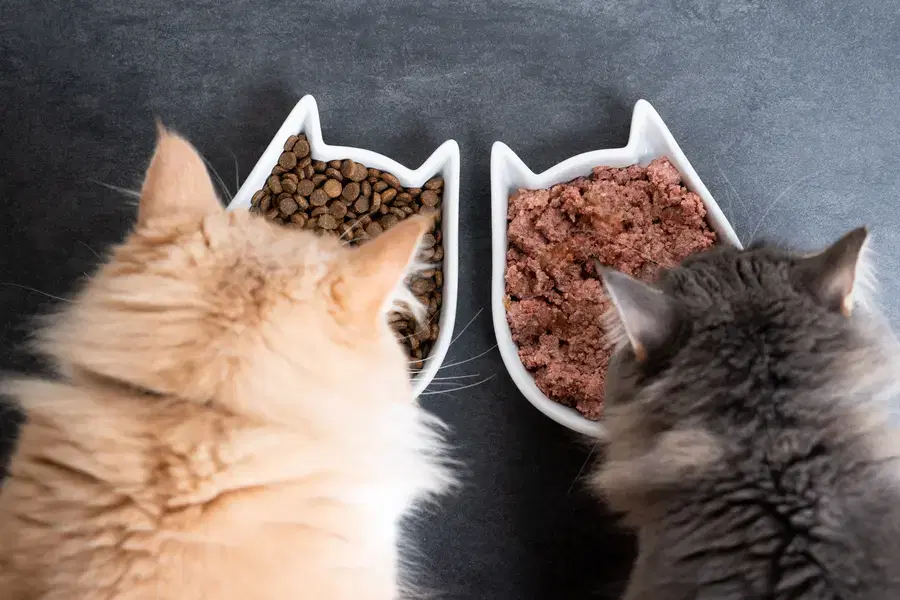Are All Seafoods Safe for Cats to Eat?
Before getting into the types of seafood cats can eat, it is important to understand what classifies as seafood.
What are the different types of seafood?
Seafood is any kind of marine life considered edible by humans, most notably fish and shellfish. Shellfish include mollusks (such as clams, oysters, and mussels), cephalopods (octopus and squid), crustaceans (such as shrimp, crabs, and lobster), and echinoderms (such as sea cucumbers and sea urchins). Marine animals such as cetaceans (whales and dolphins) and seals have historically been consumed as food, but this is less common now. Some edible sea plants, such as seaweeds and microalgae, are commonly consumed as sea vegetables across the world, particularly in Asia.
Seafood, particularly in coastal locations, is a significant source of (animal) protein in many cuisines across the world. Pescetarianism is practiced by humans who eat seafood as their sole source of meat.
Is Seafood Safe for Cats?
Cats can undoubtedly consume fish in moderation. In most situations, a fishy snack will not be detrimental to your cat, but it is also not a necessary part of a cat's diet. While fish will offer your cat the protein it needs, it is low in certain minerals and vitamins that your cat requires for a balanced diet. Fish should only be given to cats on rare occasions.1
When fed properly and in moderation, fish can be a delightful addition to a cat's diet. Many forms of fish can provide significant quantities of protein, as well as omega-3 fatty acids, which have been shown to support a healthy skin and coat while also supporting joint health by lowering inflammation.2
Keep in mind that cats should never be given raw fish as the bacteria in raw fish can lead to food poisoning. Always cook seafood and allow it to cool before adding it to your cat's dish.
Let's dive deep into the specifics of which types of fish are safe for cats to eat.2
Can Cats Eat Tuna?
Tuna is high in protein, amino acids, vitamins, and antioxidants, in addition to tasting wonderful. Canned tuna with seed oils or brine is not good for your cat.
Can Cats Eat Salmon?
Salmon which is high in omega-3 and omega-6 fatty acids, supports your cat's heart health and vision. Similar to Tuna, avoid giving your cat canned salmon. The oils and brine in the can are not healthy for your cat to consume.
Can Cats Eat Crab?
Crab flesh contains less mercury than many other forms of seafood, making it nutritionally beneficial to include it in your cat's diet on occasion. Since crabs, like mussels, rely on algae from the sea floor and reefs, it's recommended to briefly boil the crab flesh before feeding it to your cat to kill any microorganisms.
Can Cats Eat Squid?
Squids are abundant in zinc, iron, and copper, making them healthy for cats. Squid is heavy in some saturated fats, such as cholesterol, so avoid giving your cat large quantities of squid.
Can Cats Eat Caviar?
Cats can eat caviar, but it is not recommended. Caviar is not especially nutritious and can contain high amounts of salt or mercury, both of which can be toxic to cats.
Can Cats Eat Prawns?
Prawns are a nutritious and delectable addition to your cat's diet because they are high in taurine (an amino acid that supports a cat's metabolism), protein, and beneficial enzymes. Prawns, as filter feeders, can contain more germs than other seafood, so it is best to cook them before giving any to your pet. Remember to take off the shell as well.
Let’s Talk About Raw Fish
It's a strict no-no. Raw fish is not ideal for cats because it includes thiaminase, an enzyme that degrades thiamine, an essential D vitamin for your cat. Cats that do not have enough thiamine can develop serious health issues.1
Uncooked fish is a breeding ground for germs and can cause food poisoning in your cat, similar to how it can in humans. Consider E. coli and salmonella, two dangerous germs that can harm both cats and people.
If you're wondering, "Can my cat eat sushi?" The answer is no, because of the high amounts of raw fish. But, on the plus side, that means there's more for you!
What About Fish Bones?
Fishbones are as bothersome to your cat as they are to you. The main difference is that you can discover and remove the bones before swallowing them, but your cat is unlikely to notice the fine small spines until they become lodged somewhere in their mouth or digestive tract.
Not only is eating a fishbone uncomfortable for cats, but it can also cause internal organ damage. Fishbones are a choking hazard, so make sure to remove all the bones before giving the fish to your kitty. After all, they have little nutritional value when compared to a delicious slice of grilled and unseasoned fish.
What Types of Fish Should Cats Avoid?
Longer-living fish should be avoided by cats as they are more likely to build up more mercury over time. These include:2
Pufferfish: Avoid any pufferfish, including fugu.
Octopus: Some octopus species, such as the Blue-Ringed Octopus, are deadly.
Fish/Shellfish (if allergic)
Swordfish
Shark
Tilefish
Southern bluefin tuna
Ray
King mackerel
Other Factors to Consider While Giving Your Cat Seafood
Cook any seafood you feed to your cat. Seasonings such as salt, onion, garlic, and chives should be avoided; they can cause gastrointestinal discomfort, pancreatitis, and/or poisoning. Make certain that the bones, scales, and shells have been removed and properly disposed of. This can help avoid choking accidents and injury to the mouth, throat, or intestines.
Fish contains histamine, a substance secreted by white blood cells that can either prevent inflammation or trigger allergies. As a result, some cats with sensitive stomachs may develop an allergy or intolerance to fish after consuming it.3
Expert Insights From Spot
As much as we may love to spoil our cats with treats from our own plates, it's important to remember that some human foods can be harmful to pets. Spot's internal data indicates that pet insurance claims for dietary indiscretions average $642*, highlighting the need for careful consideration and research before offering cats any human food.
Conclusion
Cats don't need to have fish in their diet, but it can be a healthy and nutritious supplement to an already well-balanced diet. If your cat is given fish as a treat on occasion, he or she will most likely be alright unless they are allergic to a specific fish or seafood. Always remember to feed your cat high-quality fish. Avoid pre-packaged, ready-to-eat, or canned cuts that include salt, preservatives, and other possibly dangerous additives. You should always use boneless or deboned fish. Never feed your cat raw fish, it can result in severe vitamin deficiency.

The resident animal enthusiast at Spot. I have a lifetime of pet parent experience. If it has fur, feathers, or scales, I’ve probably shared my home with it. I aim to be a reliable source, blending experience with a dedication to the well-being of pets.
*Jan 2019 to Aug 2024 Spot Pet Insurance Services, LLC claims data.
Gerkensmeyer, Rachael. “Can Cats Eat Seafood? Vet Approved Facts & Health Guidelines.” Catster, 11 Oct. 2024, www.catster.com/nutrition/can-cats-eat-seafood.
McCoy, Jude. "Can Cats Eat Fish?" Bella and Duke, 15 Apr. 2025, https://www.bellaandduke.com/cats/expert-advice/cat-nutrition/can-cats-eat-raw-fish.
“Fish Allergy in Cats - Symptoms, Causes, Diagnosis, Treatment, Recovery, Management, Cost.” Wag, n.d., wagwalking.com/cat/condition/fish-allergy.
The information presented in this article is for educational and informational purposes only and does not constitute or substitute for the advice of your veterinarian.












